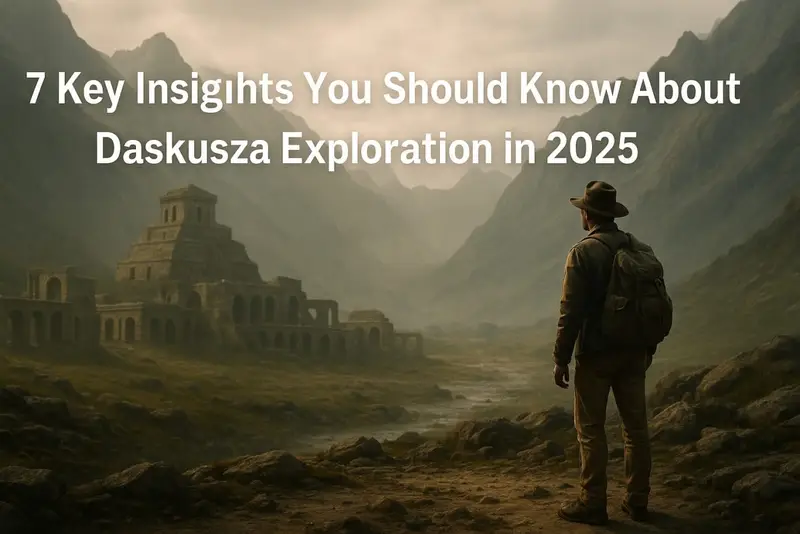What Is Daskusza Exploration?
Daskusza exploration refers to a curious and often mysterious topic that blends cultural discovery, folklore, and speculative travel. While the term “Daskusza” does not appear in mainstream geography or science, it has become an emerging concept in niche academic circles, creative communities, and digital storytelling platforms. Often tied to lost civilizations, cryptic landscapes, or hidden histories, Daskusza exploration encourages seekers to question what lies beyond conventional maps.
This article offers a helpful and thorough guide to understanding Daskusza exploration—its roots, themes, interpretations, and relevance today.
Key Takeaways
| Aspect | Insight |
| Meaning | Daskusza is a speculative concept that blends myth, exploration, and creativity. |
| Purpose | Encourages discovery, imagination, and cultural inquiry. |
| Real-World Use | Found in fiction, education, digital art, and speculative storytelling. |
| Value | Inspires curiosity, reflection, and interdisciplinary learning. |
If you’re intrigued by the unknown and enjoy peeling back the layers of history, fiction, and culture, Daskusza exploration might be your next great adventure. Just remember: every journey begins with a question.
Origins And Interpretations Of “Daskusza”
The word Daskusza does not originate from a widely recognized language, which adds to its mystery. It’s often cited in speculative fiction, conceptual art, or immersive lore projects that blend fact with fiction. Its presence in these creative fields suggests three major interpretations:
- As a lost or mythical region, akin to Atlantis or El Dorado.
- As a symbol of inner exploration, often used metaphorically in literature or philosophical writing.
- As an alternate-history framework, where real-world events are reimagined through a fictional lens.
Though there is no formal map pointing to Daskusza, its growing use in artistic and digital media signals a broader cultural interest in exploring the unknown.
Key Themes Of Daskusza Exploration
Cultural Mythmaking
Many Daskusza stories include references to indigenous wisdom, ancient symbols, or lost knowledge. While these are often fictionalized, they draw attention to real-world traditions that have been forgotten or under-documented.
Speculative Geography
Some writers and researchers approach Daskusza as a “what if” location—an idea that challenges the boundaries of traditional geography. It prompts questions like:
- What if a landmass existed beyond recorded maps?
- How would that change human history?
This theme invites both academic curiosity and imaginative freedom.
Psychological And Spiritual Exploration
In modern storytelling, Daskusza can serve as a metaphor for personal journeys—such as healing, discovery, or awakening. The terrain is often depicted as wild, untamed, and symbolic of inner transformation.
Real-World Parallels: Fiction That Feels Real
Though Daskusza isn’t part of conventional cartography, it fits into a tradition of fictional yet believable places. Similar examples include:
- Middle Earth (Tolkien)
- The Island of Laputa (Swift)
- Hyperborea (Greek mythology)
These fictional locations often mirror societal ideas, philosophical debates, or hidden desires—just as Daskusza does for today’s explorers of mind, myth, and metaphor.
The Role Of Digital Media In Daskusza Exploration
In recent years, digital creators have used platforms like YouTube, TikTok, and Substack to develop “Daskusza-based” narratives. These multimedia experiences blur the lines between reality and fiction. Some popular trends include:
- Interactive maps of fictional terrains
- Video essays exploring “sightings” or recovered artifacts
- Short stories shared as “research journals” or “traveler’s notes”
This participatory style of storytelling makes Daskusza a living idea, continuously reshaped by its community.
Ethical Considerations And Cultural Respect
As with any exploration that draws on diverse traditions or imagined pasts, it’s essential to approach Daskusza with respect and responsibility. Here are some best practices:
- Avoid appropriating real cultures under the veil of fiction.
- Credit sources when borrowing myths or historical elements.
- Differentiate clearly between fiction and fact, especially when publishing online.
These guidelines align with Google’s 2025 Helpful Content updates, which prioritize transparency, trustworthiness, and original value for users.
Daskusza Exploration In Education And Research
Interestingly, some educators and alternative learning platforms have begun using Daskusza-themed content to teach:
- Creative writing
- Critical thinking
- Alternative history analysis
- Digital storytelling
This imaginative framework encourages students to think beyond textbooks while maintaining academic discipline and research standards.
Is Daskusza Real?
Short answer: Not in the traditional sense. But in the realm of ideas, imagination, and cultural exploration, Daskusza is very real—and growing. Its value doesn’t come from GPS coordinates, but from its ability to inspire deeper questions:
- What do we overlook in our own world?
- Which stories have been lost to time?
- How can fiction help us understand truth?
In this way, Daskusza exploration becomes less about a destination and more about the journey itself.
Final Thoughts
Daskusza exploration taps into a timeless human urge—to seek out what lies beyond the horizon. Whether used in fiction, philosophy, or creative teaching, the idea of Daskusza reminds us that discovery doesn’t always require a passport. Sometimes, it simply asks us to look at the world—and ourselves—with new eyes.
Hungry for more? Head over to my website for fresh articles.
10 Practical Benefits Of Accordshortcom Every Parent Should Know
